

Trans-Pacific Partnership Reveals Deadly Cost of American Patents. While US news stories occasionally mention the breathtaking cost of some medications, they almost always skirt the issue of why American drugs are so grotesquely overpriced by world standards.
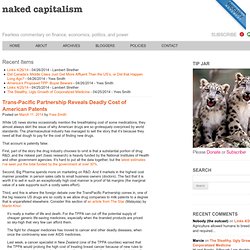
The pharmaceutical industry has managed to sell the story that it’s because they need all that dough to pay for the cost of finding new drugs. That account is patently false. As TPP Opposition Soars, Corporate Media Blackout Deafening. Last week, more than 550 groups, representing tens of millions of individual members, signed a letter to members of Congress urging them to vote against a push by President Obama for 'fast track' authority for the Trans-Pacific Partnership, a so-called "free trade" now under negotation between the U.S. and eleven other Pacific rim nations.
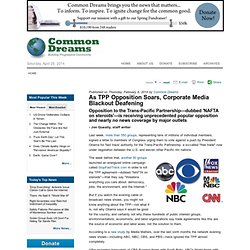
NAFTA: 20 years of regret for Mexico. It was 20 years ago that the North American Free Trade Agreement between the US, Canada, and Mexico was implemented.
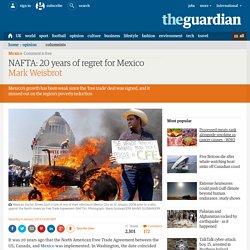
In Washington, the date coincided with an outbreak of the bacteria cryptosporidium in the city's water supply, with residents having to boil their water before drinking it. The joke in town was, "See what happens, NAFTA takes effect and you can't drink the water here. " Our neglected infrastructure aside, it is easy to see that NAFTA was a bad deal for most Americans. Obama Faces Backlash Over New Corporate Powers In Secret Trade Deal. WASHINGTON -- The Obama administration appears to have almost no international support for controversial new trade standards that would grant radical new political powers to corporations, increase the cost of prescription medications and restrict bank regulation, according to two internal memos obtained by The Huffington Post.
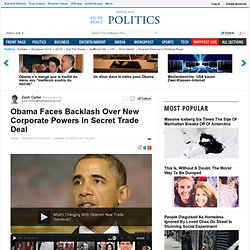
The memos, which come from a government involved in the 12-nation Trans-Pacific Partnership free trade negotiations, detail continued disputes in the talks over the deal. The documents reveal broad disagreement over a host of key positions, and general skepticism that an agreement can be reached by year-end. The Obama administration has urged countries to reach a deal by New Year's Day, though there is no technical deadline. One memo, which was heavily redacted before being provided to HuffPost, was written ahead of a new round of talks in Singapore this week. The Trans-Pacific Partnership is not about free trade. It's a corporate coup d'etat. In 2002, it was reported that British Prime Minister Tony Blair had told a friend an amusing tale about our man George W.
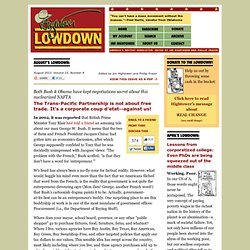
Bush. It seems that the two of them and French President Jacques Chirac had gotten into an economics discussion, after which George supposedly confided to Tony that he was decidedly unimpressed with Jacques' views: "The problem with the French," Bush scoffed, "is that they don't have a word for 'entrepreneur.'" W's head has always been a no-fly-zone for factual reality. Iran deal saps oil prices, cheers Asia shares. Marking Up the TPP. The Trans-Pacific Partnership Treaty is the Complete Opposite of 'Free Trade' A protestor demonstrates agains the Trans-Pacific Partnership in New York City.
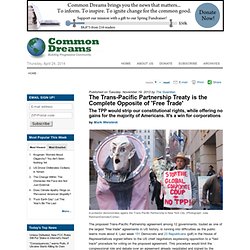
(Photograph: Julia Reinhart/Demotix/Corbis)The proposed Trans-Pacific Partnership agreement among 12 governments, touted as one of the largest "free trade" agreements in US history, is running into difficulties as the public learns more about it. Last week 151 Democrats and 23 Republicans (pdf) in the House of Representatives signed letters to the US chief negotiators expressing opposition to a "fast track" procedure for voting on the proposed agreement. This procedure would limit the congressional role and debate over an agreement already negotiated and signed by the executive branch, which the Congress would have to vote up or down without amendments. Most Americans couldn't tell you what "fast track" means, but if they knew what it entails they would certainly be against it. The United States is isolated in the Trans-Pacific Partnership negotiations. Here’s another, more quantitative perspective on the Trans Pacific Partnership from Gabriel Michael, a 5th year Ph.D. candidate at George Washington University.
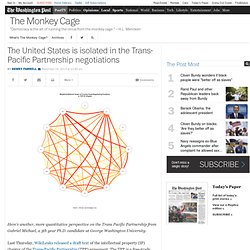
Last Thursday, WikiLeaks released a draft text of the intellectual property (IP) chapter of the Trans-Pacific Partnership (TPP) agreement. The TPP is a free-trade agreement currently being negotiated between 12 countries: the United States, Canada, Mexico, Peru, Chile, New Zealand, Australia, Singapore, Malaysia, Brunei, Vietnam, and Japan. Like many such trade agreements, the TPP has been negotiated secretly, with access to draft texts provided only to lobbyists and the like. Even Congress feels like it’s been left out.
WikiLeaks’s release thus provides an opportunity for academics, public interest groups, and citizens to examine what is being negotiated in their name. The United States is isolated in the Trans-Pacific Partnership negotiations. Flush the TPP! ← Stop the Global Corporate Coup! The People Can Defeat the Trans-Pacific Partnership. With two blows dealt to the TPP yesterday, the time to end the failed experiment with rigged corporate trade and put in place fair trade for the people and planet before profits, is now.
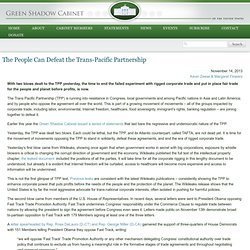
The Trans Pacific Partnership (TPP) is running into resistance in Congress, local governments and among Pacific nations in Asia and Latin America; and by people who oppose the agreement all over the world. This is part of a growing movement of movements – all of the groups impacted by corporate trade, including labor, environmental, Internet freedom, healthcare, food sovereignty, immigrant’s rights, banking regulation – are joining together to defeat it. Earlier this year the Green Shadow Cabinet issued a series of statements that laid bare the regressive and undemocratic nature of the TPP.
Yesterday, the TPP was dealt two blows. Each could be lethal, but the TPP, and its Atlantic counterpart, called TAFTA, are not dead yet. This is not the first glimpse of TPP text. A letter spearheaded by Rep. . ~ Dr. Secret Trans-Pacific Partnership Agreement (TPP) WikiLeaks Release of Secret Trans-Pacific Partnership Agreement (TPP) Advanced Intellectual Property Chapter for All 12 Nations with Negotiating Positions (August 30 2013 consolidated bracketed negotiating text) Article QQ.A.1: {Definitions}
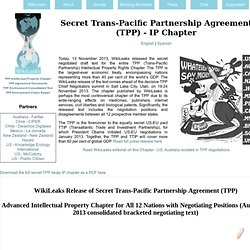
NY Times Magazine. WikiLeaks releases the secret negotiated draft text for the entire TPP (Trans-Pacific Partnership) Intellectual Property Rights Chapter. : worldnews. The Top Secret Trade Deal You Need to Know About. BILL MOYERS: This week on Moyers & Company… TPP: the big story you haven’t heard about.
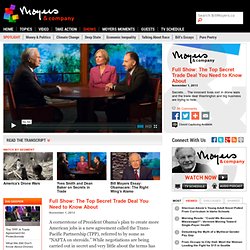
YVES SMITH: There'd be no reason to keep it so secret if it was in the interest of the public. DEAN BAKER: This really is a deal that's being negotiated by corporations for corporations and any benefit it provides to the bulk of the population of this country will be purely incidental. BILL MOYERS: And drone warfare. Deadly fire from the sky. ANNOUNCER: Funding is provided by: Carnegie Corporation of New York, celebrating 100 years of philanthropy, and committed to doing real and permanent good in the world.
The Kohlberg Foundation. Independent Production Fund, with support from The Partridge Foundation, a John and Polly Guth Charitable Fund. The Clements Foundation. Park Foundation, dedicated to heightening public awareness of critical issues. The Herb Alpert Foundation, supporting organizations whose mission is to promote compassion and creativity in our society. A Pacific Trade Deal. TPP secrets: Obama covertly granting more power to multinational corporations. Trans Pacific Partnership Digest. Obama’s Asia Free Trade Agreement Gains Momentum as Japan, Canada Sign On.
President Barack Obama’s push to expand an Asia-Pacific trade accord gained momentum at a summit in Honolulu with agreements from Japan and Canada to join what would be the largest American trade deal. Obama said nine Asia-Pacific nations aim to reach a Trans- Pacific Partnership accord within a year in what would be the biggest U.S. pact since the 1994 North American Free Trade Agreement. Japanese leader Yoshihiko Noda and Canadian premier Stephen Harper told the Asia Pacific Economic Cooperation summit they will join the talks, which may help the U.S. regain influence lost to China in a region that’s leading global growth.
Expanding the accord to add the world’s third and 10th- biggest economies may face political hurdles as leaders fight protectionism at home. Noda faces domestic opposition to the prospect of reducing a 778 percent tariff on rice, and delayed his announcement a day to placate members of his own party. ‘Very Difficult’ ‘Easily Meet’ Market Access Some Impetus ‘Flexible’ The Trans-Pacific Partnership: What "Free Trade" Actually Means. (Photo: Dayna Bateman / Flickr)To discuss “free trade agreements” or the “free market,” we must first identify the theoretical versus the functional definitions of these terms – because theoretical definitions look at what those terms should mean, whereas functional definitions look at what the terms mean actually.
The theoretical definition of a “free market” is one in which every individual actor in the realm of exchange exists in a state of equality of opportunity; where all compete with one another to produce the best products at the cheapest prices for consumers, thus the most innovative and efficient producers succeed while others fail, unregulated - and unhelped - by the state. Within “free markets,” what we call “free trade agreements” are meant to reduce barriers such as tariffs, subsidies and regulations so that market "competitors" can freely move products and goods across borders and compete in an ever-expanding global “free market.
" Secretive TPP Talks Re-Commence in Lima, Peru: They Can Shut Us Out, But They Can’t Shut Us Up. Today, trade negotiators from 11 countries meet again to secretively draft the terms of the Trans-Pacific Partnership agreement (TPP). The TPP is a sprawling multinational trade agreement that includes expansive and unfair copyright provisions. If signed, the TPP will entrench these digital enforcement measures as a global standard, leading to harsh regulations that would be disastrous for Internet users worldwide. EFF is on the ground in Lima, Peru for the 17th round of negotiations. As with all the previous TPP talks, the public is completely excluded from the process. We're here to educate and call attention to this secretive agreement until they make these negotiations transparent and democratic. As during the ACTA negotiations, Hollywood and other Big Content industries have a stronghold over international policymakers. What You Can Do.
The Trans-Pacific Partnership Agreement. Secret "Free Trade" Negotiations Will Gut Regulations, Further Enrich Multinationals and Big Financial Firms. (Image: Network in hand via Shutterstock)It’s a sign of the times that a reputable economist, Dean Baker, can use the word “corruption” in the headline of an article describing two major trade deals under negotiation and no one bats an eye. By way of background, the Administration is taking the unusual step of trying to negotiate two major trade deals in the same timeframe. Apparently Obama wants to make sure his corporate masters get as many goodies as possible before he leaves office.